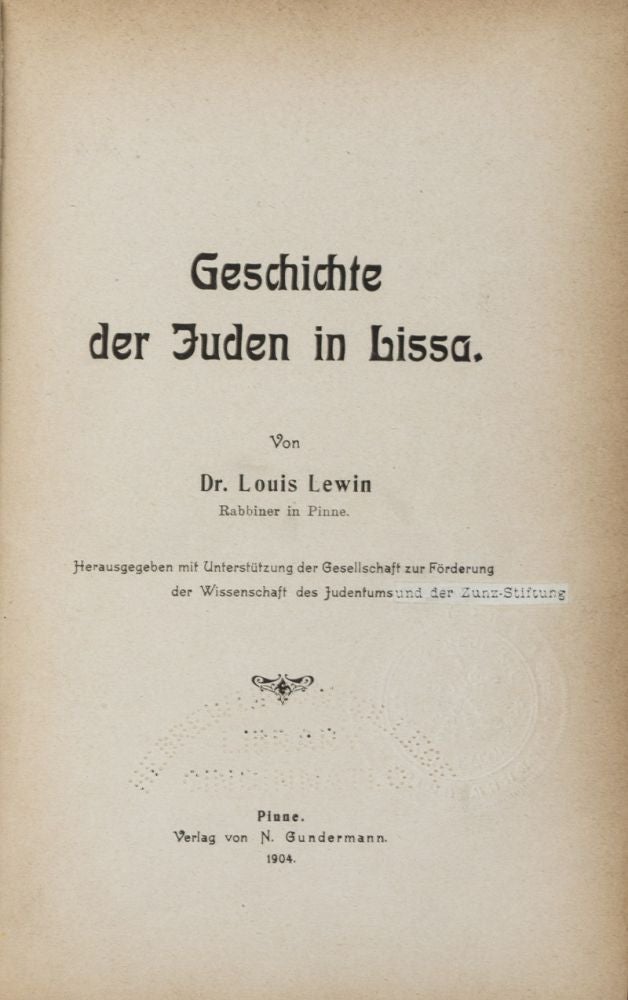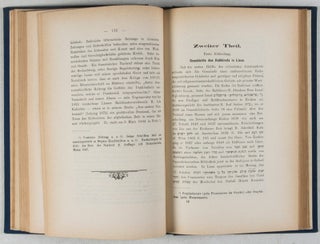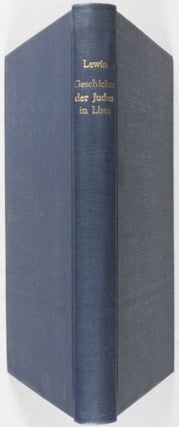Geschichte der Juden in Lissa
Pinne: N. Gundermann, 1904. First edition. Hardcover. Quarto. V, [1], 401, [1]pp. Modern blue cloth binding with gold lettering on spine. Scarce monograph on the history of the Jewish community of Lissa, Posen (today Leszno, Poland). Jewish migration to Posen started as early as the 11th century AD (and perhaps earlier), as Jews fled persecution by Crusaders in Germany. Later periods of migration followed anti-Semitic outbursts in Germany in the 12th through 15th centuries. During this time Poland was a haven for Jews, as the Polish crown granted Jews powers of self-government unheard of elsewhere in Europe (even in later years). Starting with the Statute of Kalisz in 1264, the power to settle disputes between Jews (both civil and criminal) was granted to Jewish elders. Poland was also one of the first countries to develop a parliamentary system of government, and a separate Jewish legislature, known as the Va'ad Arba or Council of Four Lands, was founded in 1581. The "four lands" were Great Poland (includes the Posen region), Little Poland, Podolia, and Galicia. The Va'ad Arba lasted until 1764, when it was dissolved by the Polish national parliament (Sejm). Alongside the Va'ad Arba was the Supreme Rabbinic Tribunal, which met while the Va'ad Arba was in session. The Rabbinic Tribunal heard appeals of disputes from the regional Rabbinic Tribunals. Previous owner's Ex-libris in Hebrew on inside of front cover. Ex-library stamps on title page. Moderate age-toning along paper margin. Text in German. Binding in overall very good, interior in good+ to very good condition. g+ to vg. Item #38629
About the author: Louis Lewin (1868-1941) was born in Znin, Posen, but was raised in Frankfurt am Main. He earned a Ph.D. degree at the University of Heidelberg in 1893 for his dissertation on Rabbi Simeon bar Yohai, and obtained rabbinic ordination at the Hildesheimer Seminary in Berlin. While in Berlin he also studied with Moritz Steinschneider, the noted Judaica bibliographer, at the Veitel-Heine Ephraim'sche Lehranstalt. Lewin followed in his mentor Steinschneider’s footsteps and developed a keen interest in collecting books and manuscripts. After completing his formal education, Lewin returned to Posen where he occupied rabbinic positions in Hohensalza (German, Inowraclaw - Polish), Pinne (Pniewy) and Kempen (Kepno). In 1920 he received life tenure as rabbi of Kattowitz, Oberschlesien (Katowice, Upper Silesia). Posen (Poznan) and Silesia (Schlesien - German, Slask - Polish) were both areas which had alternated for centuries between Germanic and Polish rule. After World War I, most of Posen and Silesia became part of Poland. Antisemitism in both regions grew, encouraging migration westward to Germany, other parts of Western Europe, and the United States. At the request of his community in Kattowitz, which officially came under Polish rule in 1922, Lewin publicly refuted antisemitic attacks published in a Polish newspaper. He subsequently received an anonymous assassination threat. This event spurred his move in 1925 to Breslau (Wroclaw), a community that was still in Germany at the time. Lewin held many prestigious posts in Breslau: director of a Jewish educational institution called “Rhedigerheim;” the rabbi of the Abraham Mugdan synagogue; an adviser for the Judisches Museum Breslau; and a member of the editorial board of the Monatsschrift fur Geschichte und Wissenschaft des Judentums. Lewin was a prolific author and wrote extensively about the history of Jewish communities in Posen and Silesia. A complete bibliography of Lewin’s writings is in Kiryat Sefer, vol. 19 (1943), p. 114-116. In 1939, Lewin moved to Bnai Brak, Israel, where he lived until his death in 1941.
Price: $225.00



